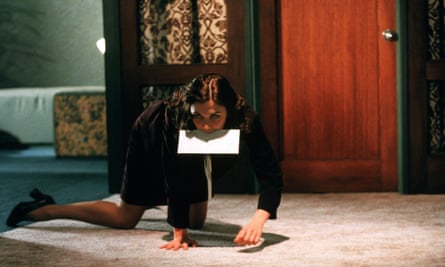Mary Gaitskill’s fiction is often called cold, or even brutal, but I have always loved it for nearly opposite reasons: its tender attention to the complexities of human emotion, and the compassion it coaxes from clear-eyed perception. Ever since the publication of Bad Behaviour, her 1988 debut collection of stories, which has become a cult classic and inspired the 2002 film Secretary, her writing has been associated with extremity, cruelty and self-destruction. But framing her work in terms of its more sensational subjects, its masochistic women and arrogant men, threatens to overshadow its soulful explorations of the inextricable relationship between intimacy and pain, just as calling her work cold misunderstands the grace at its core.
At 65, Gaitskill’s body of work spans three story collections, a book of essays and three novels, including Veronica – about the improbable friendship between a former model and a proofreader dying of Aids in 1980s Manhattan – and, most recently, The Mare, about a Dominican teenager and her bond with the white couple she stays with for several summers. Ever since Gaitskill first exploded on the literary scene – a teenage runaway from Michigan whose backstory immediately became part of her mystique – a generation of younger writers has been worshipping and wrestling with her authorial voice.
Gaitskill has earned a reputation for being intimidating in person, but when she picks me up at the train station near her home in the Hudson Valley, just north of New York city, I am struck by her graciousness. It’s not the kind of graciousness that involves agreeing with everything I say – the false solidarity of hollow nods – but rather a precision of presence that sometimes manifests in clarification or resistance. We stop to buy pastries, and then head back to her home, where she worries about making the coffee too strong for my liking.
I am here to talk about her new book, This Is Pleasure, a story about a scandal that I make the mistake of calling a novella. “I don’t consider this a novella,” she tells me. “Novella sounds like a cigarillo or something.” It is told from the alternating perspectives of Margot, an editor whose “professional reputation … was made [by] a book of charming stories about masochistic women” (sound familiar?), and her longtime friend Quin, a book editor forced to resign after a sexual harassment lawsuit is filed against him.
It is a book that will inevitably be discussed as a commentary on the #MeToo movement it is clearly responding to, but the exacting rigour of its craft deflects attempts to extract a hot take of its gender politics. The very structure of the story – its dual voices and surprising vantage points, its forensic attention to fraught scenes rife with ambiguity – constitutes a formal rejoinder to the sweeping generalisations about “sexual harassment” that Gaitskill understands herself to be resisting. Even the phrase itself constitutes, for her, a blanket category that risks occluding the subtleties of particular encounters: “I don’t like the word ‘harassment’ any more,” she tells me. “That doesn’t always seem to be the right word.”
With this book, Gaitskill explains, she wanted to approach the familiar narratives of the #MeToo movement – “the bigger story that has been splattered all over the media and social media” – from a more intimate, nuanced perspective: “The subject, the way I’ve told it, is a very private story, from the inside point of view,” she says. “[Having] two people was a way to contain it [and] there was a beauty in containment, because the thing about the bigger story … is that you see the currents, but you often don’t see people really feeling it.”
When I ask if Gaitskill ever considered structuring the book from the perspectives of accuser and accused she says no: “It didn’t strike me as very interesting. I felt like it would have been very difficult not to make [her] sound like a hundred other voices that have already been represented.”
In a way, Margot does offer the voice of a victim, except that her experience complicates everything that word implies. One early scene in This Is Pleasure describes a moment near the beginning of Quin and Margot’s friendship, when they are having lunch at a restaurant: “‘You are so much stronger now! You speak straight from the clit!’” he tells Margot, and then, as she remembers years later: “as if it were the most natural thing in the world – he reached between my legs. ‘No!’ I said, and shoved my hand in his face, palm out, like a traffic cop. I knew it would stop him … Looking mildly astonished, Quin sat back and said, ‘I like the strength and clarity of your “no”.’ ‘Good,’ I replied.”
Recollecting this meeting years later, Margot thinks: “The main thing I remember from that night was the expression on his face as he retreated from my upraised palm, the surprised obedience that was somehow grounded and more genuine than his reaching hand had been.”

I ask Gaitskill what she wanted to illuminate about Quin in that scene, whether his “genuine” expression came from a sense of encountering an authentic response, even if it was a refusal. “That’s exactly it,” Gaitskill says. “I’ve had that experience where a man … It’s almost like they are glad [to have] a genuine connection coming back to them.” In a 1994 Harper’s essay called “The Trouble With Following the Rules”, Gaitskill describes one of these experiences: making out with a casual friend after dinner one night, both of them drunk, as he became more and more aggressive. “I do remember taking one of his hands in both of mine, looking him in the eyes and saying, ‘If this comes to a fight, you would win, but it would be very ugly for both of us. Is that really want you want?’” His expression changes; and then he leaves.
Gaitskill doesn’t deploy the anecdote as a call for resistance so much as a call for more complexity in our stories. Immediately after the scene ends, she confesses that in the “original version of this essay … I didn’t mention that we became lovers for the next two years” and admits that “in omitting the aftermath of that ‘responsible’ decision, I was making the messy situation far too clear-cut, actually undermining my own argument by making it about propriety rather than the kind of fluid emotional negotiation that I see as necessary for personal responsibility.”
That resistance to simplifying the “messy situation” is part of what animates This Is Pleasure, though she tells me that fiction allowed her to write more directly about feelings: “That essay was more rational, talking about my mind more than my emotions,” while in the story, “what I’m writing about … is [the] women’s ambiguity about some of the things that have happened.” She refers to a scene in which Quin playfully spanks a younger co-worker, a woman who becomes one of the plaintiffs in the lawsuit against him. “In my mind,” Gaitskill says, “that girl in the story, she’s flirting, she’s joking – she doesn’t really expect him to do it. They go to lunch, they have a good time; she doesn’t really know how she feels until later.”
Gaitskill is quick to point out that she’s not trying to excuse Quin’s behaviour – “I’m not saying he’s blameless” – but rather making room for shifting layers of feeling. She wants to make it clear she hasn’t written a book that blames women for acts of aggression committed against them, or excuses the men who have committed them – rather she’s insisting on a level of nuance that she believes is often elided from these narratives. At the core of This Is Pleasure is a complicated friendship, after all, rather than a lawsuit. Margot holds a lot of anger toward Quin, and a lot of gratitude for the support he has offered her, the playfulness of his spirit, the singularity of his mind. This anger and that gratitude exist at once, in uneasy relation.
Gaitskill tells me she understands the need driving Quin as “a need for love, [a] very strong need to have women look at him, smile at him, be dependent on him, want him for something, want him to touch them. I could be wrong, but I would interpret that as a need for love. Maybe there would be men [for whom] it would purely be a need for power, but not in the character I’ve created.” And after a pause: “I’m sure some people would think that is too soft.”
In her Harper’s essay, Gaitskill describes her evolving emotions around an unwanted sexual encounter with a young man in Detroit: “For some time after, I described this event as ‘the time I was raped’ … At times I even elaborately lied about what had happened, grossly exaggerating the threatening words, adding violence – not out of shame or guilt, but because the pumped-up version was more congruent with my feelings of violation than the confusing facts.” The great intellectual and ethical feat of the essay that follows – a project continued by This Is Pleasure – is its insistence on giving space to both the feelings of violation and the confusing facts.
When I ask Gaitskill about the moment in This Is Pleasure when Margot reflects on the “book of charming stories about masochistic women” that forged her reputation – “I have never quite separated myself from that titillating yet tiresome aura”– she just laughs: “Who could that be?” She explains that it was a slight exaggeration of her own feelings about Bad Behaviour, which has become a touchstone for a younger generation of writers, including Kristen Roupenian, whose short story “Cat Person” went viral in 2017 and is now a text Gaitskill herself teaches. She doesn’t find the enduring fascination with that first book “tiresome,” exactly, but sometimes bewildering: “I don’t think it’s the best book I’ve written,” she says, though she tells me that This Is Pleasure “could be a more mature story in Bad Behaviour. It’s definitely on that continuum.”
And what about her critical reception – the way her work has often been read as cruel and unsentimental? “I find it painful and also confusing,” she tells me, paraphrasing Flannery O’Connor’s quip that readers who found her work grotesque had never been to the south. Gaitskill is suggesting that some people might find the worlds of her own fiction brutal largely because they are so unfamiliar, but part of me wonders if people call her work brutal not because of what they don’t know, but because of what they do know, and how difficult it can be to face certain kinds of knowledge. I can believe that someone might find Gaitskill’s narrative terrain exotic – a reader who has never been spanked, or been to a strip club – but I can’t believe there are readers who haven’t encountered the ways love inevitably holds pain.
